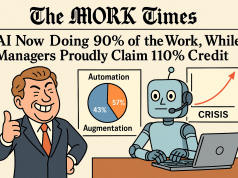As we stand at the crossroads of the most significant era of workplace transformation, the traditional trajectory of career development is being rewritten. The catapulting progress in automation, artificial intelligence (AI), and the unrelenting pace of technology calls for a new kind of agility in the workforce. Gone are the days when a single degree would pave the way for a lifetime career. Today, we are witnessing the dawn of the Skills Revolution – a time when the currency of one’s expertise is in constant flux, demanding perpetual adaptation and upskilling.
The essence of career development is no longer a linear path but a multifaceted journey of continuous learning. In this landscape, upskilling and reskilling have emerged as the keystones for professionals looking to not just survive but thrive. Upskilling — the process of learning new skills to enhance current job performance, and reskilling — the learning of new skills for a different job role, are no longer optional. They are essential practices that enable individuals to stay apace with the evolving demands of the job market.
The rise of micro-credentials exemplifies the shift towards more modular and focused learning experiences. These bite-sized qualifications are designed to provide learners with specific skills that are in demand by employers, often in a shorter timeframe than traditional degrees. Not only do they offer a pathway to life-long learning, but they also foster an environment where career progression is based on demonstrable skills rather than formal education alone.
Remote work, which saw an exponential rise during the pandemic, has also had a profound impact on career development. It has opened doors to a global talent pool, revealed the potential for decentralized workplaces, and changed the paradigm of professional development and networking. Yet, it also poses unique challenges in terms of visibility for career advancement and access to mentorship opportunities.
Businesses and educational institutions have a critical role to play in this transition. Progressive organizations are already crafting learning and development programs that align with the evolving skills landscape. Meanwhile, educational institutions are adapting curricula and introducing courses that are more attuned to the practical requirements of modern industries.
However, amid this revolution, it is vital to recognize the disparities in access to career development opportunities. Economic, geographic, and socio-cultural factors can significantly impact an individual’s ability to engage with lifelong learning and career progression. Society as a whole must take proactive steps to bridge these gaps, ensuring that the future of work is inclusive and equitable.
As readers of The Work Times, you are encouraged to reflect on your career development strategies and how they align with the shifting expectations of employers. In a world where change is the only constant, positioning oneself for success requires an openness to learn, unlearn, and relearn. Let us embrace the Skills Revolution with a mindset that views career development not just as a means to an end, but as an ongoing journey of personal and professional growth.
The Skills Revolution is upon us, and the question stands: are you ready to adapt to the new norms in career development?




























